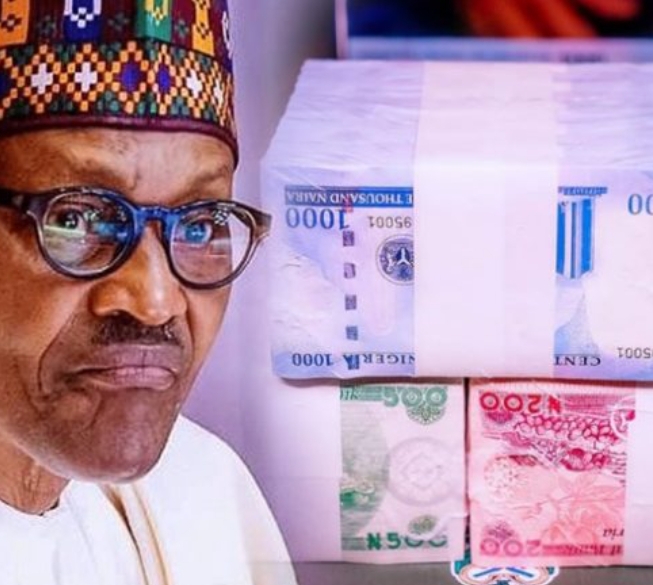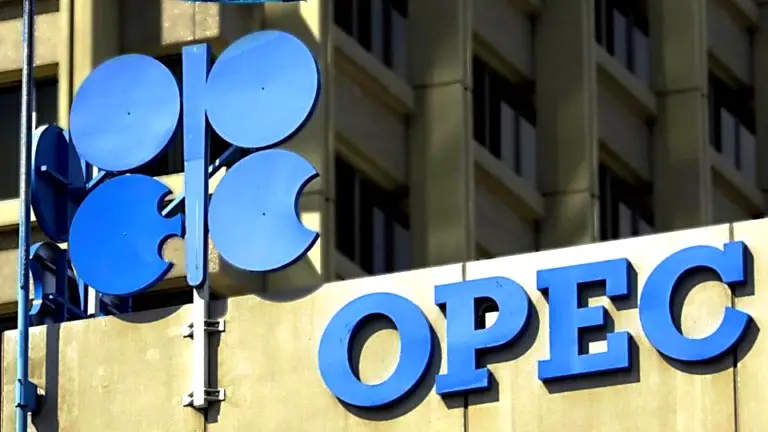Business
New Naira: Confusion As Presidency Says CBN Has No Power To Act Until…
Published
1 year agoon
By
Editor
The Presidency has said that neither the Federal Government nor the Central Bank of Nigeria had taken a stand on the continued use of the old N200, N500 and N1,000 notes as legal tenders seeing that the case is still pending before the Supreme Court, which will hear it today (Wednesday).
The Senior Special Assistant to the President on media and Publicity, Garba Shehu, said the FG would make its position on the new naira policy known after the determination of the suit on Wednesday.
In a response to a question on Tuesday, he said: “Following series of enquiries, we wish to state that it is not true that the FG or the CBN has taken a pre-emptive action on the legality of currency as a legal tender in view of the pendency of the case before the Supreme Court.
“We wish to state that it is not true that the Federal Government or the Central Bank of Nigeria, CBN have taken a preemptive action on the legality of currency as a legal tender in view of the pendency of the case before the Supreme Court.
“The position of the government and the CBN will be made known upon the determination of the suit coming up tomorrow.”
READ ALSO: Coalition Fumes As Commercial Banks Reject Notes
This comes about one week after the Supreme Court, in a ruling on February 8, suspended the CBN’s February 10 deadline to halt the use of old naira notes.
The bank had ordered citizens to exchange old N200, N500 and N1,000, banknotes for a redesigned version of the same currencies.
However, the Supreme Court, responding to an ex parte application filed by the governments of Kaduna, Kogi and Zamfara, stopped the CBN from effecting its ban on the old notes pending the hearing and determination of the case on Wednesday, February 15.
You may like


How I Collected Dollars In Cash For Emefiele, Dispatch Rider Tells Court


Presidency Unveils Platform For Citizens’ Feedback


JUST IN: CBN Sells FX To BDCs At N1,101/$1


JUST IN: CBN Gov Sacks Eight Directors, 32 Others


BREAKING: Jim Obazee Concludes CBN Probe, Submits Report To Tinubu


CBN Raises Capital Base For Mega Banks To N500bn

The Dangote Petroleum Refinery has announced a reduction in the price of Automotive Gas Oil, popularly called diesel, from N1,200/litre to N1,000/litre.
It announced this in a statement issued on Tuesday by its spokesperson, Nduka Chiejina.
The statement read in part, “In an unprecedented move, Dangote Petroleum Refinery has announced a further reduction of the price of diesel from N1,200 to N1,000/litre.
READ ALSO: NNPP Faction Suspends Kano Governor For Six Months
“While rolling out the products, the refinery supplied at a substantially reduced price of N1,200/litre three weeks ago, representing over 30 per cent reduction from the previous market price of about N1,600/litre.
“This significant reduction in the price of diesel at Dangote Petroleum Refinery is expected to positively affect all the spheres of the economy and ultimately reduce the high inflation rate in the country.”
According to The PUNCH report, last week, oil marketers called on the refinery to reduce its diesel price, as they urged managers of the facility to sell at N850/litre.
Details later…
Business
Nigeria’s Oil Production Drops Again, Now 1.23mbpd – OPEC
Published
5 days agoon
April 12, 2024By
Editor
Nigeria’s crude oil production witnessed the second consecutive monthly decline since the beginning of this year, as it dropped to 1.231 million barrels per day in March, the Organisation of Petroleum Exporting Countries stated on Thursday.
OPEC disclosed this in its latest Monthly Oil Market Report for April 2024, stating that crude oil production details which it got through direct communication from Nigeria showed that the country pumped less oil in March when compared to what was produced in February.
Data from the report indicated that Nigeria produced 1.322 million barrels per day of crude in February this year, but this dropped to 1.231mbpd in March, representing a plunge of 91mbpd.
The report further stated that the country had produced 1.427mbpd of crude in January, but this was not sustained in February as it dropped in that month, while the southward oil production continued in March.
OPEC data, however, showed that the country’s average crude oil production in the first quarter of 2024 was 1.327mbpd, higher than the 1.313mbpd average oil production in the fourth quarter of 2023.
Nigeria’s first quarter oil output in 2024 was also higher than the 1.201mbpd average production in the third quarter of last year.
READ ALSO: Oil Production Rises 26.57m Bpd In February — OPEC
Oil theft and pipeline vandalism have dealt severe blows on Nigeria’s oil production, limiting the country’s output and making it fall below the volume approved for Nigeria by OPEC.
The PUNCH reported on Wednesday that the Nigerian National Petroleum Company Limited recorded 155 oil theft incidents in one week.
The report that stated the company revealed that during the review period, 53 illegal pipeline connections and 36 illegal refineries were uncovered in the Niger Delta.
“Between March 30 and April 5, 2024, a total of 155 incidents were recorded across several locations in the Niger Delta region from various incident sources,” the firm stated.
In a summary of the incidents, NNPCL stated that it recorded 53 illegal connections, discovered 36 illegal refineries and 32 wooden fibre boats, identified 14 pipeline vandalism cases, eight vessel infractions and four oil spills, as well as made seven vehicle and one vessel arrests.
Some of the incident sources include the Nigeria Agip Oil Company, Tantita Security Services Ltd, NNPCL Command and Control Centre, Shell Petroleum Development Company, NNPCL 18 Operating Ltd, among others.
READ ALSO: Oil Drops Further After OPEC Delay With Asian Stocks Mixed
Providing additional details, the company said, “In the past week, 32 wooden boats conveying stolen crude and illegally refined products were seized and confiscated in Rivers and Delta states.
“On land, seven vehicles loaded with stolen crude were arrested in Imo, Delta and Rivers states. 53 illegal connections were uncovered between March 30 and April 5, 2024 in Bayelsa, Rivers and Delta states.
“14 cases of vandalism were also recorded in Rivers, Bayelsa and Delta states, while illegal storage sites where stolen crude and illegally refined products are kept were uncovered in Akwa Ibom, Bayelsa, Rivers and Delta states.”
The national oil company also stated there were clusters of illegal refineries in Abia State, as activities of oil thieves had devastated the effected environments in the state.
It said 36 clusters of the illegal refineries were discovered in the past week across several locations in Rivers and Abia states.
“Four cases of oil spills due to activities of vandals were recorded in the past week,” NNPCL stated, adding that in Rivers State, oil leaks from a wellhead is destroying aquatic lives.
NNPCL stated that 38 suspects were arrested during the week under review, stressing that the national oil company would not back down on the war against crude oil theft until the menace is eradicated.
READ ALSO: OPEC Cuts Nigeria’s Oil Output By 20.7% To 1.38 mb/d
Nigeria has been losing trillions of naira to crude oil theft, a development that has made some international oil companies to divest from onshore to deep offshore oil fields, while others have exited the country.
In November 2023, for instance, The PUNCH reported that the Federal Government revealed that more than N4.3tn worth of crude oil was stolen in 7,143 pipeline vandalism cases within a period of five years.
The report stated that the government disclosed this at the Nigeria International Pipeline Technology and Security Conference in Abuja, with the theme, ‘Bolstering Regulations, Technology and Security for Growth.’ The conference was organised by the Pipeline Professionals Association of Nigeria.
In a presentation at the conference by the Nigeria Extractive Industries Transparency Initiative, a Federal Government agency, the organisation revealed that oil theft and losses in Nigeria had become a national emergency.
The Executive Secretary, NEITI, Ogbonnaya Orji, said oil theft was an emergency that posed serious threat to oil exploration and exploitation with huge negative consequences on economic growth, business prospects and profit earnings by oil companies.
Providing data from the agency’s reports to back his claims, he said, “NEITI disclosed that in the last five years, 2017 to 2021, Nigeria recorded 7,143 cases of pipeline breakages and deliberate vandalism resulting in crude theft and product losses of 208.639 million barrels valued at $12.74m or N4.325tn.
“NEITI reports also disclosed that during the same period Nigeria spent N471.493bn to either repair or maintain pipelines.”
PUNCH
Business
Banks Get Three-month Deadline To Stop Forex-backed Loans
Published
1 week agoon
April 9, 2024By
Editor
The Central Bank of Nigeria on Monday stepped up its fight to boost foreign exchange liquidity in the economy with a new circular mandating Deposit Money Banks to stop the use of foreign currencies as collateral for naira loans within 90 days.
The development happened as the naira rose against the greenback at both the official and parallel markets on Monday.
The CBN has continued to deepen its battle to free dollar liquidity stocked up in the financial system by deploying various measures aimed at shoring up the naira against the United States dollar.
On Monday, the Olayemi Cardoso-led CBN issued a new circular, expressing concerns over the use of foreign currencies as collateral for naira loans.
The circular made available on its website and titled “The use of foreign-currency-denominated collaterals for naira loans”, was referenced BSD/DIR/PUB/LAB/017/004.
Although this is not the first time the bank has prohibited the use of FCY, it said it had observed the use of foreign currency by bank customers as collateral for naira loans. Hence, the decision to prohibit its use.
READ ALSO: JUST IN: CBN Sells FX To BDCs At N1,101/$1
In 2023, in a confidential letter to commercial lenders, the apex bank issued a stern directive against naira overdrafts backed by foreign currency deposits.
In the leaked letter dated August 17, 2023, and signed by the Director of Banking Supervision, Mr. Haruna B. Mustafa, the CBN said the development followed its findings from a recent supervisory review.
It was uncovered that the banks had been offering naira overdraft facilities secured with foreign currency deposits.
Despite this warning, the new directive indicates that banks have continued to engage in such practices.
In the latest circular signed by the acting Director, Banking Supervision Department, Adetona Adedeji, the apex bank said it observed the use of foreign currency by bank customers as collateral for naira loans.
As such, the regulator directed banks to trim all existing loans with foreign currency collaterals to 90 days or attract a 150 per cent capital adequacy ratio computation as part of the bank’s risk.
The new directive means a borrower may no longer use dollar deposits in their domiciliary bank accounts as collateral to obtain naira loans.
READ ALSO: EFCC Arraigns Three Ex-bankers, One Other For N15.9m Fraud
According to stakeholders, the practice is partly due to the need to hedge against foreign currency spikes which can be costlier than interest rates.
“The Central Bank of Nigeria has observed the prevailing situation where bank customers use foreign currency as collaterals for Naira loans.
“Consequently, the current practice of using foreign currency-denominated collaterals for Naira loans is hereby prohibited except where the foreign currency collateral is Eurobonds issued by the Federal Government of Nigeria or guarantees of foreign banks, including standby letters of credit.
“In this regard, all loans currently secured with dollar-denominated collaterals other than as mentioned above should be wound down within 90 days, failing which such exposures shall be risk-weighted 150% for Capital Adequacy Ratio computation, in addition to other regulatory sanctions,” the circular read.
The CBN’s stance against such practices arises from concerns of currency mismatch, which could introduce substantial financial risks for banks.
READ ALSO: Band A Customers Decry Extortion By Power Firms Amid Poor Supply
Rather than convert their dollars to naira, some borrowers will rather borrow in naira as the cost of buying the dollars back might be higher than the interest rate they pay for borrowing in naira.
However, this can have a ripple effect on the exchange rate due to its speculative tendencies.
The CBN maintained that it was on a mission to ensure adequate foreign exchange in the market even as the naira gains strength.
Eurobonds, according to the Hong Kong and Shanghai Banking Corporation, are bonds issued offshore by governments or corporations denominated in a currency other than that of the issuer’s country.
Eurobonds are usually long-term debt instruments and are typically denominated in US dollars.
READ ALSO: Top 10 Richest Women In The World 2024
Letters of Credit, according to the International Trade Administration, are contractual commitments by the foreign buyer’s bank to pay once the exporter ships the goods and presents the required documentation to the exporter’s bank as proof.
As a trade finance tool, Letters of Credit are designed to protect both exporters and importers.
The PUNCH reports that in the apex bank’s previous circular to all the banks signed by its former Director, Corporate Communications Department, Ibrahim Mu’azu, the bank said its attention was drawn to the increasing use of foreign currencies in the domestic economy as a medium of payment for goods and services by individuals and corporates.
It also observed that some institutions price their goods and services in foreign currencies and demand payments in foreign currencies rather than the domestic currency (the Naira), which is the legal tender in Nigeria.
The CBN stated, “For the avoidance of doubt, the attention of the general public is hereby drawn to the provisions of the CBN Act of 2007, which states inter-alia that “the currency notes issued by the Bank shall be legal tender in Nigeria…for the payment of any amount.”
Furthermore, the Act stipulates that any person who contravenes this provision is guilty of an offence and shall be liable on conviction to a prescribed fine or six months imprisonment.

Reps Give SEC, FRC Ultimatum On N45bn Unremitted Funds

UCL: Barca Suffer Blow As PSG Make Turnaround Into Semi-finals

Double Tragedy As Man Punches Relative To Death During Father’s Burial
Trending

 Metro3 days ago
Metro3 days agoWoman S*xually Abuses Child, Films It In Viral Video

 Entertainment3 days ago
Entertainment3 days agoJnr Pope: ‘That Guy No Suppose Knack Bell’ – Boat Captain Narrates His Own Side Of Story [VIDEO]

 News3 days ago
News3 days agoDeadly Flog: Girl Caught In Camera Beating Up Baby With Rod [VIDEO]

 Metro4 days ago
Metro4 days agoJUST IN: Bobrisky Jailed With No Option Of Fine

 News2 days ago
News2 days agoVideo: Moment Pastor Enenche Sent Lady Away For Giving False Testimony On The Altar

 Entertainment4 days ago
Entertainment4 days agoWhy Court Sentenced Bobrisky To Six Months In Prison

 Entertainment3 days ago
Entertainment3 days agoBoat Mishap: ‘This Is My Story’ – Movie Producer, Adanma Luke, Breaks Silence [VIDEO]

 News5 days ago
News5 days agoFULL LIST: Covenant Beats UI, FUTA To Retain Nigeria’s Best Varsity Spot

 News3 days ago
News3 days agoViral Video: Edo CP Orders Investigation, Mental Test For Police Constable

 News4 days ago
News4 days ago3rd Mainland Bridge Crash: Body Of One Of The Occupants Recovered






























